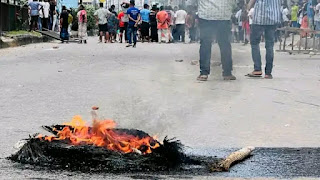Bangladesh Protests: Grappling with Violence and a Call for Change
In recent weeks, Bangladesh has been gripped by widespread protests, sparked by the death of two students in a road accident. What began as a call for improved road safety has since evolved into a broader outcry against the government, raising concerns about the country’s political and social landscape.
The tragic incident that ignited the protests occurred on July 29th, 2023, when two college students were struck and killed by a speeding bus in the capital city of Dhaka. This tragedy struck a chord with the nation’s youth, who had long been frustrated by the poor state of the country’s infrastructure and the government’s perceived inaction on public safety issues.
Initially, the protests were focused on demanding justice for the victims and improved regulations for public transportation. However, the demonstrations soon expanded to encompass broader grievances against the government of Prime Minister Sheikh Hasina, who has held power since 2009.
According to reports, at least 35 people have been killed and hundreds more injured in the ensuing clashes between protesters and security forces. The government has been accused of using excessive force, including the use of live ammunition, to quell the demonstrations.
Prime Minister Sheikh Hasina, who has been in power for over a decade, has faced growing criticism for her administration’s handling of the crisis. The protesters have accused the government of cracking down on dissent and failing to address the underlying issues that have fueled the unrest.
As the situation continues to unfold, there is a pressing need for a peaceful resolution that addresses the legitimate concerns of the protesters. Some potential paths forward could include:
Comprehensive Reforms: The government should consider implementing sweeping reforms to improve public infrastructure, strengthen road safety regulations, and enhance accountability within the transportation sector.
Inclusive Dialogue: Rather than resorting to heavy-handed tactics, the government should engage in open and constructive dialogue with the protesters, allowing their voices to be heard and their demands to be addressed.
Independent Investigation: An impartial, third-party investigation into the initial incident and the government’s response could help restore public trust and pave the way for a just resolution.
Political Concessions: In the long term, the government may need to consider political concessions, such as early elections or including opposition voices in the decision-making process, to address the underlying political tensions.
The situation in Bangladesh remains tense, and the path forward will require a delicate balance of addressing the protesters’ legitimate concerns while maintaining stability and order. Failure to do so could further exacerbate the crisis and lead to more violence and unrest.





No comments